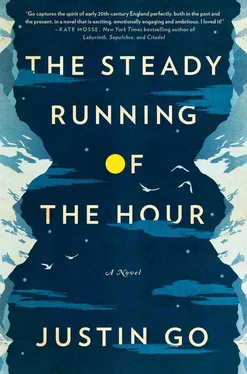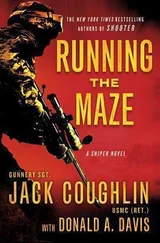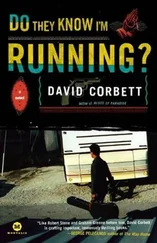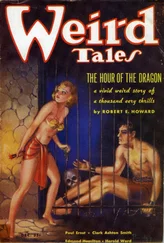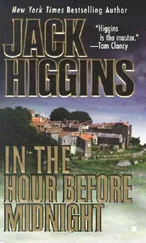— The howitzer missed them, sir. But there’s no water.
Ashley finds a candle amid the refuse on the floor and gives it to the German officer, lighting it with a match from his pocket. He puts the matchbox in the German’s hand. The officer smiles.
— Don’t worry, Kamerad . They may be gone now, but they’ll be back.

Ashley and Mayhew climb back to the surface. They find Sergeant Bradley and the men moving sandbags to reverse the defenses, blocking off traverses on each side to prevent flanking attacks. Ashley looks up at Empress Redoubt. It looms in the mist still a hundred yards beyond them, past the second line of German defenses. Sergeant Bradley takes Ashley aside.
— The Huns took their guns with them. We’ve done what we can, but if they come back in any number—
— The Border Regiment will be along in relief.
— They think we’re dead, sir. If they were coming, they’d have come by now.
— They’ll come all right.
The German counterattack begins ten minutes later. It starts with a fearsome bombardment of mixed high-explosive and shrapnel shells. The parados comes aflame with shock and light. A huge explosion rocks the nearest fire bay, surging flame and smoke down the trench. Ashley and the sergeant dash around the corner. They find Gregory already dead with much of his head missing, his mouth torn open to reveal a wreck of shattered teeth. Stewart is screaming as blood pours from an enormous gash in his stomach. The sergeant shoves a bandage into the wound, telling Stewart he will be all right, but the blood wells up over the bandage and the sergeant’s hands. Stewart turns white and stops breathing. More shrapnel bursts overhead, wounding Private Reynolds badly in the arm. Ashley wraps the arm quickly, but Reynolds has to abandon his rifle, holding the lifeless right arm with his left hand, his face ashen, small cuts all over his neck.
Ashley hurries across into the traverse, looking over the parados with his periscope toward the German reserve lines. The machine guns have opened in orange flashes. He can make out a line of gray figures approaching at an arm’s length apart, the column spanning a huge field of mud. Mayhew stands beside him on the fire step, rapidly firing his rifle.
— There’s millions, Mayhew murmurs.
— Only a hundred or so, Ashley says.
He gives the order to retreat. The four men climb the ladder out of the trench and crawl between the openings in the German wire. They make westward for Patience Trench, a nest of wire and yellow flashing guns in the distance. With a sluggish jog they hobble through the mud, artillery raining upon them. A high-explosive shell bursts nearby in a hurricane of red flame. Ashley is tossed against the ground, his ears ringing as he spits mud and blood from his mouth. He must have bit his tongue. He sees the sergeant, the man’s eyes wide in dazed horror, pulling himself forward by the arms through the muck, the stumps of his legs dragging on the ground, gushing crimson. Mayhew slings his rifle and grabs the sergeant’s arm, pulling him forward. Ashley takes the other arm and they carry the bleeding sergeant to a shellhole, ducking under a heap of black clay. Mayhew is yelling at Ashley, but the ringing is very loud.
— What?
— Dead, sir. Sergeant’s dead.
— Where’s Reynolds?
— Gone, sir. We should take cover here, wait for nightfall.
Ashley cannot hear. He catches his breath and points toward Patience Trench. The two men rise and set off. They pass rusted heaps of wire, dud artillery shells planted in the mud. Mayhew points and says something Ashley cannot hear. They go left around an enormous crater, and then descend a short ridge. A trench is in the distance ahead, perhaps the British line. Another shell bursts above them. A rain of pellets. Then a second concussion, a third, mud and smoke and steel everywhere. Ashley falls to the ground, sucking for air. His ears are still ringing.

The trenches are the softest of hills now, waist-high mounds of grass threading minute valleys among the sleeping fields. I’m the only one here. I walk on new and shiny planks, ducktracks re-created on the old trench floor. A nylon rope is strung along the side for safety. A red plastic sign is staked in the dirt. PATIENCE TRENCH. DANGER: UNDETONATED EXPLOSIVES.
I hop over the rope and scale the mounds on all fours, my hands pulling at tufts of damp grass. No-man’s-land. I find a hollow between the tallest of knolls. Lying back against the grass, I read from Ashley’s letters in my notebook.
Who are these people we fight against? I never see their faces, except those of the dead.
The sun rises behind them as it sets behind us; theirs is the east & it belongs to them. We own the dawn, as breaking light draws their shadows against the horizon. They own the dusk. We are clad in khaki where they are grey. Their wire is stronger & thicker than ours, their rucksacks of queer dark cowhide, the fur still attached.
And yet they are men, no different from us, and when we prick them they shall bleed, and have their just revenge. ‘The villainy you teach me, I will execute, and it shall go hard but I will better the instruction.’
After an hour I come out of the trench, ducking under the rope and walking to the parking lot. At two o’clock Mireille pulls the car up and gets out.
— How was the coast? I ask.
— Really windy, so it was hard to draw. But the light was pretty. I have my sketchbook, I thought I might draw something here.
We walk across a flat field to the cemetery, white headstones arrayed in neat rows of ten. The grass is finely manicured and there are small trees throughout the cemetery.
— Did all these people die around here?
— I think so.
Mireille walks on toward a stone monument on the far end of the cemetery, her sketchbook under her arm. I stay behind reading the headstones.
5/2819 PRIVATE P. ECCLES
DURHAM LIGHT INFANTRY
5 NOVEMBER 1916 AGE 19
HE ANSWERED THE CALL
At the end of the cemetery I find Mireille inside the monument, a tall cross surrounded by a circle of white stones.
— Tristan, I think this is also a grave—
— It can’t be.
Mireille crouches in front of one of the white stones.
— But look at this. It’s like a tombstone, but there’s no name.
I walk closer to the stone. At the top it says A SOLDIER OF THE GREAT WAR — ROYAL BERKSHIRE REGT.Beneath this is a large white cross and the inscription KNOWN UNTO GOD. Dozens of these headstones are arranged in a circle surrounding the cross. Mireille touches the stone, frowning.
— Why are they like this? Why don’t they have their own graves like the others?
I look around the monument, but the only inscription is by the small entrance gate: EAUCOURT CEMETERY. Mireille is still looking at the headstone. She puts her hand to her face.
— Tristan, what’s under here?
— I don’t know. I read about some mass graves. Sometimes there were too many, they’d just put them all in a shellhole—
I walk around the base of the monument. A few of the stones have flowers or red paper remembrance poppies in front of them.
— But maybe it was a different place, I say. Maybe it wasn’t Eaucourt.
Mireille stands and looks at the fields around us. She picks up her sketchbook and starts walking back toward the car. I follow after her.
— Do you want to draw the cemetery?
— No, she says. Let’s go home.
Читать дальше
